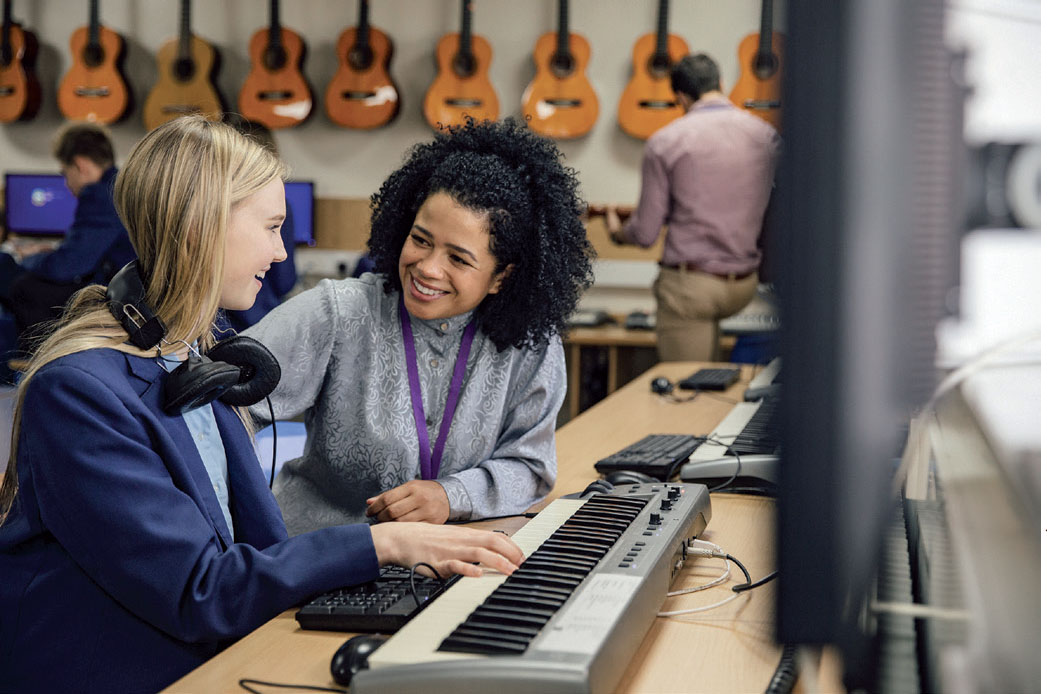
Jobs in music education are many and varied. With so much evidence of music's beneficial effects on wellbeing and happiness – see Susan Hallam's book The Power of Music, which is freely available online – the world certainly needs music teachers. At the same time, music education is increasingly reliant on freelance or zero-hours workers, which makes it harder than ever to turn a casual job into a career with benefits, progression, and pay that increase with experience. This article is an introductory guide to this fulfilling but often challenging area of work.
Perhaps the principal job in music education is that of the classroom music teacher, which encompasses specialist music teachers at secondary level and mostly generalists at primary level. Independent schools place an importance on music apparent from orchestra images that populate their websites; this part of the sector often provides a fruitful route for those wishing to specialise in school music for any age group. Meanwhile, the state sector, which accounts for the education of more than 93% of children, seems to be veering away from music because of pressure from the government to focus on so-called core subjects. Tragically, the effect of this has been to decimate secondary music departments and the number of secondary music teacher jobs. Still, if you can get one of these jobs you are eligible for benefits like paid school holidays and teachers’ pension as well as the satisfaction of doing some rewarding work. This is especially apparent at Key Stage 3, where your students will have had a vast array of prior musical experiences for you to bring together.
Primary music usually means training to be a generalist classroom teacher. All primary teachers – most of whom would call themselves non-musicians – are tasked with teaching music, usually after the barest minimum of musical training (typically one day in year-long programme). If you are interested in primary music and already have some skills – and can find a school with a head who supports the subject – the possibilities for creating a joined-up, school-wide musical programme can be exciting. You will also have the chance to work with generalist teachers who are often terrified of music, playing an important role in helping them discover that they can in fact ‘do it’. Both secondary and primary classroom music teachers are eligible for a discounted joint membership of the MU and the National Education Union (NEU).
 DGM Images/ Adobe Stock
DGM Images/ Adobe Stock
Music education hubs (England only) are essentially a rebrand of the old local authority music services. They mainly provide schools with instrumental tuition, including ensembles and whole-class instrumental and vocal teaching. Nowadays, they are forced by funding cuts to be quite entrepreneurial and often offer curriculum music lessons and even GCSE and A Level classes. Some might find it sad to see core school provisions being outsourced like this, but hubs mostly deliver good work from a position of expertise. All this means that there is much work to be had in hubs but sadly, hub teachers are frequently engaged on zero-hour contracts with no paid travel or preparation time, and of course no pension, sick pay, or other employment benefits. From the MU's perspective, not only is it sad to see this work rewarded so poorly but it also means that hubs often can't attract or hold on to good teachers. For that reason we continue to challenge dubious employment practice where we can. It should also be noted that some hubs are choosing to move over to employment models, which is encouraging. Contractual issues aside, hub teaching can make for some interesting and varied work.
Private teaching is self-employed work, so you need to be comfortable running a small business if you want to do it. Some private teachers pursue this work as part of varied professional portfolios, while others run busy studios as their sole occupation. Contracts and policies are required to head off any issues with non-payment and the MU website has a range of free resources to help you with this. Private teaching offers freedom in the sense that no one tells you what to teach and you can set your own terms, but MU members report that it can often be isolating (which is a good reason to become an MU member and benefit from the networking events and training we offer).
There are other types of music teaching too, of course – early years, outreach and community music leading to name but three – so be sure to explore all the options and read any contract carefully (and ask for one if it is not forthcoming). Good luck and enjoy sharing music!
For more advice, email teaching@themu.org.








